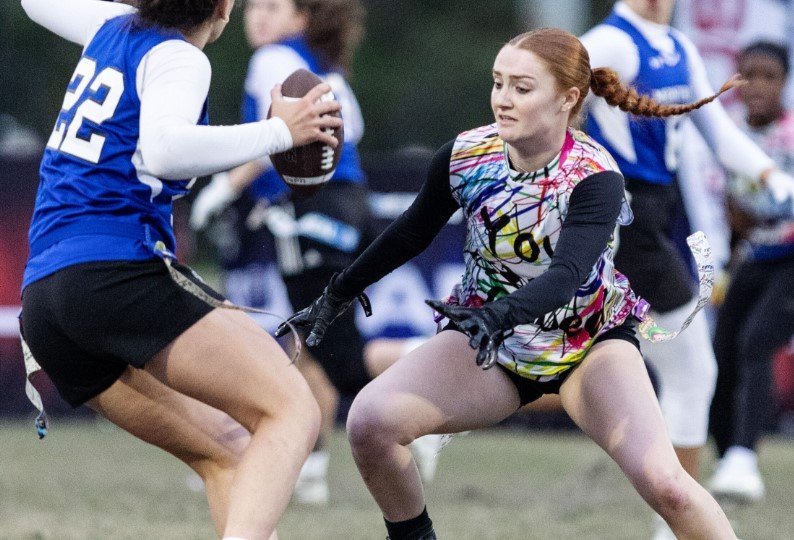League expands its African footprint through grassroots coaching, with Cairo emerging as a key player in women’s flag football
Cairo just hosted something it’s never seen before. On a sun-drenched pitch tucked behind concrete apartment blocks, whistles blew, playbooks were opened, and 36 women huddled shoulder to shoulder—coaching, learning, running drills. No, not for soccer. For flag football.
In a first for the region, the National Football League (NFL) held a women’s flag football coaching clinic in Egypt’s capital this week, welcoming participants from Egypt, Nigeria, and Morocco for an intense training program that combined classroom theory with cleat-grinding practice. The goal? Long-term coaching pipelines—and maybe even future NFL Flag World Champions.
Cairo Emerges as NFL’s African Testbed
The Cairo event marks a significant expansion in the NFL’s strategy for growing flag football globally. While the league has experimented with youth camps and talent hunts in places like Ghana and Kenya, this was something different. This was coaches teaching coaches.
The idea is simple: You empower women locally to run programs in schools, clubs, and communities. And you don’t do it half-heartedly—you send your best.
Ameena Soliman, Director of Football Operations and Pro Scout with the Philadelphia Eagles, flew in for the clinic. She wasn’t alone.
Joining her were:
-
Afia Law, NFL Flag’s international development lead
-
Elisa De Santis, the French national team captain and NFL Global Flag Ambassador
-
Kris Durham, the former Detroit Lions receiver who now leads the NFL Academy Europe-Africa
-
Jordan Mabin, a former NFL defensive back turned youth development coach
That lineup alone could run a mini training camp. And in Cairo, that’s almost what they did.

From Boardroom to Sidelines: Women Drive the Change
For most of the 36 participants, this wasn’t just about learning flag football rules. It was about being seen, being taught, being trusted with a whistle.
Ameena Soliman, one of the NFL’s rising stars and a Muslim-American woman in a deeply male-dominated field, told participants, “You don’t have to look a certain way to lead. If you know your stuff and show up for your team, you belong.”
And they did show up. They broke down offensive strategies in the morning. They braved Cairo’s sweltering heat to run 7-on-7s in the afternoon. By day three, many were already diagramming their own drills. One Egyptian participant sketched an entire defensive playbook in Arabic.
There was one moment that stood out—a Moroccan coach in her 20s, wearing a hijab, throwing a perfect spiral downfield as Jordan Mabin yelled “DIME!” from the sideline.
For many, this wasn’t just a coaching clinic. It felt like a beginning.
What the NFL Wants in Africa, and What Africa Wants in Return
So why Africa? And why now?
The NFL has made no secret of its global ambitions. Flag football—lighter, faster, and cheaper than tackle football—is its Trojan horse. And Africa, with its surging youth population and deep love for sport, is fertile ground.
According to NFL data, participation in flag football has grown by 38% globally since 2021. In Africa alone, the league estimates youth interest has doubled over two years. Cairo, with its mix of schools, sport academies, and state-backed infrastructure, was the perfect pilot.
But the real pitch here isn’t just for kids. It’s for Olympic recognition. The International Olympic Committee added flag football to the 2028 Los Angeles Summer Games. The NFL needs global teams, especially female teams, to build legitimacy.
And that’s where Africa becomes essential.
Learning on the Field, Leading at Home
By the time the final day came around, the Cairo clinic didn’t feel like a one-off.
Each country’s delegation received gear kits, digital coaching manuals, and access to NFL Flag’s global coaching platform. But more importantly, they were challenged to return home and train 20 new coaches within six months.
Here’s how each country’s presence broke down at the clinic:
| Country | Coaches Attending | Expected Local Training Targets | Primary Focus Area |
|---|---|---|---|
| Egypt | 16 | 320 trainees | School-based programs |
| Nigeria | 12 | 240 trainees | Club & youth leagues |
| Morocco | 8 | 160 trainees | Community centers |
That means, in theory, this one clinic could reach 720 new female coaches across North and West Africa by early next year. That’s not small potatoes.
Not Just a Photo Op
It would’ve been easy for this to feel like a PR stunt. Big logos. Fancy speeches. Photo ops with ministers.
But Kris Durham shut that down early.
“This isn’t about turning everyone into a pro player,” he told the group. “It’s about giving your communities something real—structure, discipline, opportunity.”
Participants took that seriously. By the end, they’d formed WhatsApp groups to share training schedules. They mapped out talent ID programs. Some even pitched joint tournaments between countries.
One Nigerian participant whispered mid-huddle, “I’m thinking of starting a league.”
The Bigger Picture, and a Few Loose Ends
To be clear, challenges remain. Access to fields. Cultural attitudes. Funding. Basic things like footballs and jerseys are hard to come by in many parts of the continent.
But the NFL seems to know this isn’t a short sprint. It’s a slow build. One coach. One drill. One local team at a time.
And the women? They’re not waiting for the perfect setup. They’re already sketching their next plays.
